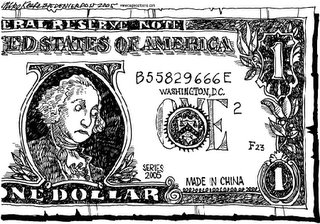There is a new generation of young Australians who have grown up knowing no other political reality in their voting lives beyond that of the present Liberal Party. For those people, the consequences of living for 10 years in the shadow of John Howard are profound and alarming.
If we chart the social and cultural implications of Howard's leadership on the generation now roughly between the ages of 18 to 30, there is strong evidence of a cultural malaise resulting in massive disengagement with the political realities that will affect their future lives. There are many demonstrable manifestations of this cultural malaise.
The language of the Howard Government on religious minorities and refugees has resulted in a generation desensitised to the very human realities and manifestations of global inequity and ethnic difference. When Howard talks of "queue jumpers" and "illegals" to describe refugees, there is a knee-jerk tendency among young people to apportion blame rather than feel empathy. This is a state of affairs that Howard has personally overseen, a significant paradigm shift that entrenches a deep and pernicious ethos of social hierarchy and privilege.
Simultaneously, there is a tendency of young people to flock to evangelical religious movements in the past five years, particularly in the outer suburbs of our capital cities.
Within these new popular religious movements disengagement with mainstream political reality is fostered. To many of these groups, "family values" becomes a code for being anti-gay, anti-euthanasia and anti-abortion. It is alarming to hear how frequently young people today embrace this kind of neo-conservatism, almost like a race to see who can be more right-wing.
Moreover, with Howard's constant talk of a very white-bread brand of traditional family values being paramount to a good society, we have seen a sudden rush of young people to get married early, get a home loan and shift to the suburbs at the first opportunity. This obsession has even extended into the gay community, which after fighting for 30 years to keep the government out of the bedroom, now appears to be fighting for the approval of Howard for their relationships.
Coupled with this, we have witnessed in Australia a new kind of hyper-consumerism. The social centre of town on any given evening is now the local shopping centre. Young people are all too eager to get the biggest credit limits possible, and max their Visa cards out with the casualness of a walk in the park. Indeed, the Howard era has brought us closer to US style ultra-materialism, where "retail therapy" is the new buzz word. Feeling bored or depressed? Better get to Westfield shopping centre. The so-called metrosexual male has become little more than a crass marketing ploy. Shut up and shop
These trends are compounded further in popular culture directed at young people. The most popular new magazines for Australia's youth include titles such as Vice, Alpha Male and Ralph. Slick sexy pictures and throwaway humour create the illusion of a cool, sophisticated read. But -- these hugely popular titles seek to anaesthetise readers by making a joke of all critical political thought, and exhorting the virtues of fashion, vanity, laziness and apolitical hedonism. The magazines have become one of the publishing success stories of the last few years in Australia, attracting the biggest advertising revenues because advertisers always cotton on to a good con when they see it.
This generation has also been the generation to feel the impacts of the transition to a privatised society the most deeply. We have witnessed public transport losing its emphasis on personal service, while suffering a tangible decline in efficiency. And the "user pays" mentality that has now infiltrated health care, higher education and the utility sector has ultimately chipped away at the notion of the common good, that as individuals we are willing to make a collective sacrifice for the betterment of society as a whole.
It's the inverse of socialism, the death of big picture idealism - lost to the ethos of debt, competition, user-pays culture, and rampant individualism.
And because young people in Australia under Howard have been given (or have taken) few opportunities to vent their spleen or collectively analyse their predicament, there is the tendency to bury our heads in the distractions afforded by new technology.
Gil Scot Heron rapped in the '70s that the revolution will not be televised; I am equally convinced that the revolution will not be downloadable to your iPod.
Make no mistake, the Howard era, commensurate with the global rise in unchecked hyper-consumerism and commercial technological overkill, has precipitated an era of compounded political disengagement among young people in Australia. Do I overstate things?
Is the Howard Government actually sensitive and open-minded to the needs of young Australians? Are the young actually engaged and in touch with their own best interests?
Consider this. In December 2004 the Federal Government downgraded the Minister for Children and Youth Affairs, held at the time by Larry Anthony, to the status of a junior parliamentary secretary role.
Then just last month, with no fanfare and barely registering the slightest ripple of protest, the Government scrapped the Youth Affairs portfolio from the Federal Parliament altogether.
Not only is this Government completely out of step with the realities of the lives of young people in 2006, but the present generation of young Australians, after 10 years of Howard, is utterly anaesthetised and practically disengaged from the political processes that governs it.
No wonder they have got away with it for so long.
James Norman is a journalist and author. He is researching a book on the Howard decade and its impact on young people.
People get the government they deserve. Dumb downs get a dumb down government.
That's democracy at work
 Photo : Iraqi Journalist Attwar Bahjat, who worked for Aljazeera before moving to Alarabia .
Photo : Iraqi Journalist Attwar Bahjat, who worked for Aljazeera before moving to Alarabia .















